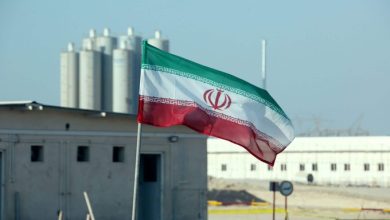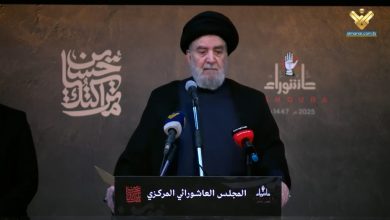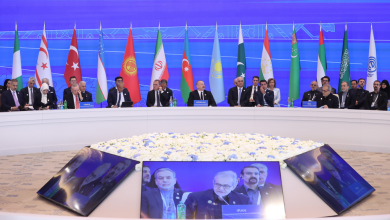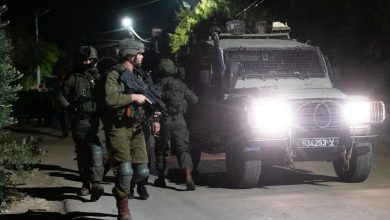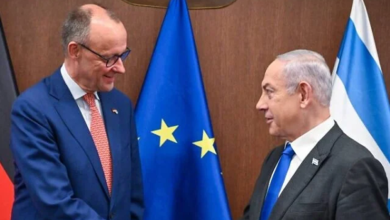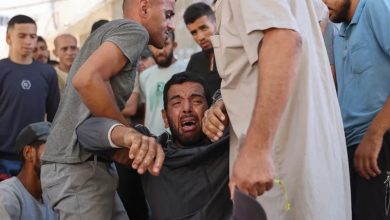Larijani Announces Iran’s Preparations for Response to Israeli Aggression
Ali Larijani, adviser to Ayatollah Seyed Ali Khamenei, the Leader of the Islamic Revolution, announced that Iranian military and government authorities are formulating appropriate measures in response to recent acts of aggression by Israel.
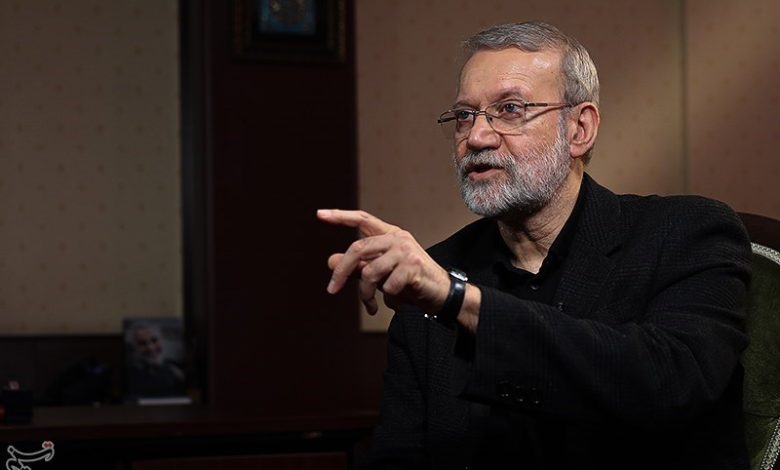
On October 1, in a retaliatory move following the Israeli assassination of Hamas political bureau chief Ismail Haniyeh, Hezbollah Secretary General Seyed Hassan Nasrallah, and IRGC General Abbas Nilforoushan, Iran launched approximately 200 ballistic missiles targeting military and intelligence installations of the Zionist regime across the occupied Palestinian territories.
In the early hours of October 26, Israeli forces launched an assault on several military installations in Iran, resulting in the deaths of four soldiers and one civilian, according to local reports.
In response to questions regarding potential escalations between Iran and Israel following recent Israeli actions, Ali Larijani, in an exclusive interview with Tasnim, emphasized the importance of restoring deterrence. Larijani stated, “This is a crucial matter. The appropriate authorities are diligently addressing the issue to guarantee that Iran’s future actions towards Israel meet these criteria.”
“In broad terms,” he stated, “this matter should be entrusted to the appropriate military authorities to make the right decision. I am aware that they are considering various approaches to arrive at that decision.”
Larijani emphasized the necessity for meticulous deliberation and confidentiality concerning the matter, citing its implications for Iran’s national security.
On October 27, Ayatollah Seyed Ali Khamenei, the Supreme Leader of the Islamic Revolution, underscored the importance of challenging and dismantling the misguided assumptions held by the Zionist regime concerning Iran.
The Leader has warned of a strategic miscalculation concerning Iran, emphasizing that it is the responsibility of national officials to accurately evaluate and determine the necessary actions that align with the country’s and its citizens’ best interests. It is imperative, the Leader asserted, that foreign adversaries gain a clear understanding of the character and capabilities of the Iranian populace and its youth.
In response to inquiries regarding his recent trip to Syria and Lebanon in the context of ongoing Israeli strikes, Larijani stated that he delivered a message from Ayatollah Khamenei to officials in both nations.
He stated that the message from the Leader of the Islamic Revolution contained significant insights for both nations amidst the region’s current climate. He added that, in essence, the messages’ core spirit pertinent to today’s context stresses the importance of applying the same strategies that had previously led to success.
Larjani expressed optimism that the message would be effectively conveyed, given the mutual interests demonstrated by both nations.
When questioned about allegations of an Israeli plot, supported by the United States, to revive terrorist groups in southern Syria against the government of President Bashar al-Assad, Larijani remarked, “It is conceivable that such actions could be taken. Hezbollah forces have effectively resisted Israeli forces, demonstrating their capability. Given Israel’s lack of success in Lebanon, it seems imperative for them to manifest their initiatives in other regions.”
He emphasized that the matter is well-known to Syrian officials, pointing out that “these strategies are ineffective as they do not address the underlying issues, and thus, cannot achieve their intended objectives through such schemes.”
In response to inquiries regarding the perception that Hezbollah has been significantly weakened following recent Israeli strikes, particularly due to the reported martyrdom of leaders such as Sayyid Hassan Nasrallah and Sayyid Hashem Safi al-Din, Ali Larijani commented on the evolving security dynamics in Lebanon. He noted that initial assessments suggested a severe setback for Hezbollah, potentially paving the way for its removal from the Lebanese political landscape. However, Larijani emphasized that the security landscape has altered, marking a new phase in these developments.
Analyzing the current conditions, it appears that Israeli Prime Minister Benjamin Netanyahu finds himself in a complex political and security predicament. After maintaining military pressure for approximately 40 days, his position has been questioned due to a lack of tangible progress on the ground. This has prompted observers to wonder about the underlying reasons behind the stalled advancement in operations.
He explained that the resolution traces back to Hezbollah’s response, as the group strategically recalibrated by replacing its commanders and forces after suffering significant losses.
Larijani expressed his belief that Lebanese Hezbollah will emerge triumphant in its conflict with Israel. He stated, “Hezbollah possesses an extraordinary capacity. After meeting the youth in Lebanon, I am assured that, with God’s grace, they will achieve victory. Their high morale is crucial, as it is the primary factor in warfare.”
In response to inquiries regarding potential direct negotiations between Iran and the United States, Larijani noted that the two nations have continued to engage in indirect discussions, even during the administration of the late President Ebrahim Raisi.
In reference to potential future discussions, he stated, “The timing of negotiations is contingent upon national interests. The appropriate authorities might deem it inadvisable at present or might find it suitable under specific conditions at a later date.”
Officials have stated that they are unreserved in articulating their perspectives, citing a strategic rationale for their positions. They emphasize a willingness to engage in negotiations when such discussions align with national interests. Reflecting on a previous instance in Iraq, they noted that a request was received to enter talks with the United States. At that time, their evaluation indicated that negotiations would be beneficial, as they aimed to stabilize the situation in Iraq, leading to their decision to proceed with the talks.
In response to inquiries about the IAEA resolution against Iran, spearheaded by the EU3, Larijani stated that the Europeans are repeating previous errors.
He stated that while Western observers were under the false impression that Gaza and Hamas had been dismantled and Hezbollah neutralized, the situation shifted against them. Consequently, they repeated past errors by advocating for a resolution targeting Iran.
Ali Larijani reported that Iran is actively enriching uranium to levels exceeding 60% purity. He further highlighted that, despite efforts, the United States has been unsuccessful in deterring Iran from producing additional centrifuge machines.
The official stated that Western nations have the option to pursue a rational strategy by engaging in negotiations with Iran.
Referring to the United States’ exit from the Joint Comprehensive Plan of Action (JCPOA), Larijani stated that this move did not yield benefits for the US and imposed economic costs on Iran. In response, Iran increased its uranium enrichment efforts and upgraded its technological infrastructure.
He stated that Western nations had hindered their development efforts, yet emphasized that Iran remained resilient and steadfast. Highlighting the determination and resilience of both the country and its people, he underscored Iran’s commitment to challenging any unreasonable or misguided policies.
In response to demands for a shift in Iran’s nuclear strategy, Larijani emphasized that Western nations, who assert that Iran’s case with the International Atomic Energy Agency (IAEA) has a legal dimension, should permit the IAEA to conduct its work independently. He urged these countries to refrain from meddling in the operations of the United Nations’ nuclear watchdog.
In response to inquiries about Iran addressing Western concerns without reciprocal efforts to ease Iran’s economic anxieties, Larijani stated, “If they do not take any initiative to resolve the issue, naturally, Iran will refrain from acting as well.”
He asserted that Western nations are unable to impose more stringent economic measures on Iran, as they have already implemented a policy of maximum pressure.
In response to inquiries regarding the belief that the outgoing U.S. President Biden has relaxed sanctions on Iran’s oil sales, allowing former President Trump the potential to halt Iranian oil exports once more, Larijani stated, “Such claims are unfounded. The U.S., including the Biden administration, has consistently sought to obstruct Iran’s oil sales to the best of its ability. Nevertheless, Iran has successfully devised methods to continue its oil sales.”
Labeling the potential threat of renewed pressures on Iran as a performative media stance, he remarked that the nation is already subject to a comprehensive array of sanctions. “Nonetheless, I must stress that we do not welcome such circumstances or the imposition of new sanctions. In my view, the most advantageous path for everyone involved is through negotiations and resolving the issue amicably. This approach aligns with our national interests and would likewise benefit Western nations, including the United States,” he stated.
He noted a shift in the global landscape, highlighting that countries such as Russia have also faced sanctions. “Effectively, nations under sanctions have coalesced into a bloc engaging in mutual interaction and trade,” he stated.
In response to inquiries regarding the state of US-Europe relations during the Trump administration, Larijani emphasized the critical importance of the Ukraine issue for European nations.
He highlighted the importance of the Ukraine conflict for the Democratic Party, while suggesting that its prominence might diminish during a Trump administration.
He stated that the conflict in Ukraine represents a battle of prestige for both Russia and Europe and is unlikely to conclude through such maneuvers. While the United States might partially retreat from its involvement in the European and Ukrainian affair, he predicted that internal debates within Europe would intensify, given the gravity of the situation for European nations.
Larijani asserted that Iran’s nuclear program is not the sole issue currently under consideration on the global stage, emphasizing the existence of numerous other dossiers that demand attention.
Hello! How can I assist you today?

